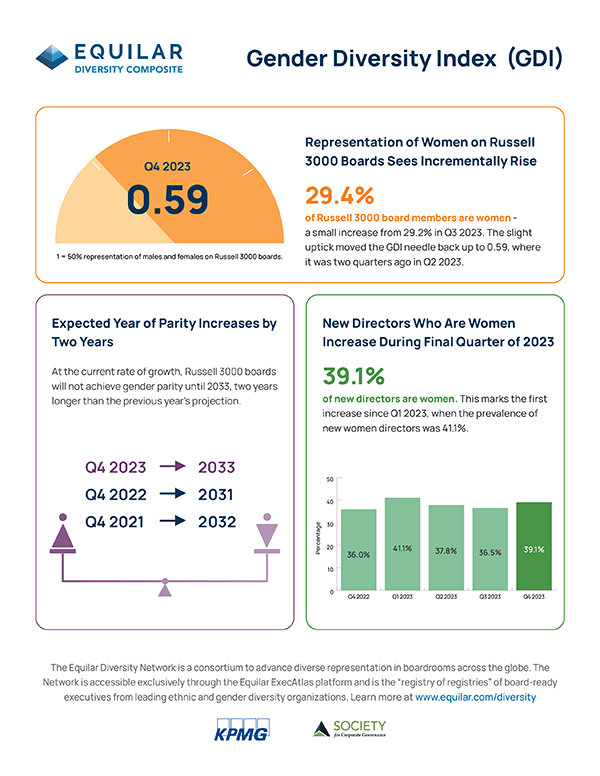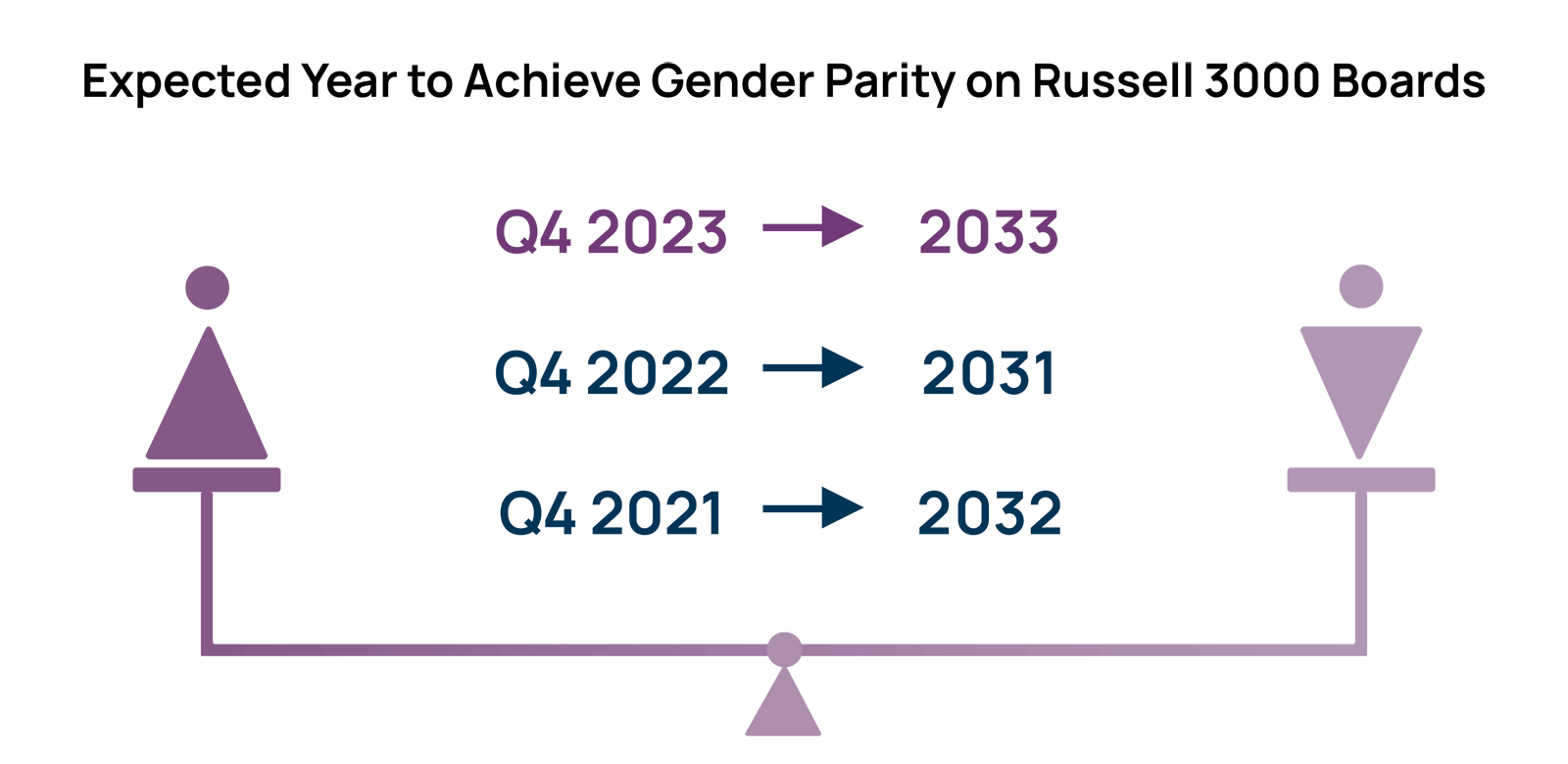Q4 2023 Equilar Gender Diversity Index
Russell 3000 Boards On Pace to Achieve Gender Parity by 2033, Two Years Longer Than Previous Projections
March 8, 2024
Joyce Chen
International Women’s Day serves as a global platform to celebrate the achievements of women and advocate for gender equality across all facets of life, including corporate leadership. In recent years, there has been a significant surge in awareness regarding the representation of women in boardrooms, reflecting a growing recognition of its importance for both organizational performance and societal progress.
The latest edition of the Equilar Gender Diversity Index (GDI) highlights key findings through the path towards achieving gender parity on Russell 3000 boards. The GDI needle now sits at 0.59, a metric where 1.0 represents gender parity.

Looking deeper into the analysis of board composition within the Russell 3000, 29.4% of board members are women as of the end of Q4 2023, marking a slight yet noteworthy increase from the preceding quarter’s figure of 29.2%. This modest growth helped to push the needle from 0.58 back up to 0.59, a level it had reached two quarters ago in Q2 2023. Such developments underscore a positive trend towards greater gender diversity within corporate leadership and are a testament to the ongoing efforts to ensure diverse representation at the decision-making table.
Furthermore, the percentage of new directors within the Russell 3000 who are women increased to 39.1% during Q4 2023, representing a 7.1% increase since Q3 2023. This positive trajectory is significant, given the previous consecutive decreases observed in Q2 and Q3 of 2023. This marks the first increase since Q1 2023 when the percentage of new female directors stood at 41.1%.
| Year |
Percentage |
| Q4 2022 |
36.0 |
| Q1 2023 |
41.1 |
| Q2 2023 |
37.8 |
| Q3 2023 |
36.5 |
| Q4 2023 |
39.1 |
The higher percentage of women among new directors could be attributed to internal and external factors driving organizations to prioritize gender diversity and inclusion in their boardrooms. Last October, a U.S. appeals court upheld Nasdaq's board diversity rule, which requires companies listed on the exchange to have women and minority directors on their boards or explain why they do not. The National Center for Public Policy Research and the Alliance for Fair Board Recruitment requested the 5th U.S. Circuit Court of Appeals to block the rule.
“Shareholders and other stakeholders continue to be strongly focused on board composition and the value that diversity brings to board oversight of strategy and risk," explained Susan Angele, Senior Advisor at KPMG’s Board Leadership Center. “As they engage with companies, investors want to know that the boardroom conversation is enriched by a strong, diverse mix of relevant backgrounds and perspectives.”
Additionally, the increasing number of boards with between 40% and 50% female representation reflects a positive trend towards greater gender diversity within corporate leadership structures. From Q1 2023 to Q4 2023, there has been a notable uptick, with the number of boards in this range rising from 297 to 328, a significant increase of 10.4%. Furthermore, while there was a temporary decline in the number of boards with at least 50% women between Q2 and Q3 of 2023 (declining from 169 to 161), there was a 3.7% rebound in Q4 2023, as 167 boards have now achieved this milestone.
| Year |
Count |
| Q1 2023 |
297 |
| Q2 2023 |
309 |
| Q3 2023 |
319 |
| Q4 2023 |
328 |
Despite the progress made in the increased inclusion of women on boards, it is essential to acknowledge that challenges remain. Over the last year, the growth of women on boards has slowed down. The anticipated year for achieving gender parity on corporate boards has been extended to 2033, which is two years longer than last year's projection of 2031. “A slowdown in the growth rate of women joining boards might be caused by any number of reasons,” said Angele. “Given the large number of women who are available and able to offer tremendous value in corporate boardrooms, those boards that actively work to tap into this pipeline may benefit from a competitive advantage.”

The percentage of boards with no female representation sits at 2.1%. Meanwhile, the percentage of companies that added a female director—having previously had no women—is at 1.6%. Despite continued efforts and initiatives aimed at achieving gender parity, these challenges persist as reminders of the need for sustained and unwavering commitment to fostering true gender diversity and inclusion in corporate boardrooms.
Moving forward, it is imperative for organizations to redouble their efforts in addressing systemic barriers, biases and cultural norms that inhibit the advancement of women in leadership positions. By prioritizing diversity from the top in the boardroom, organizations can collectively work towards creating corporate environments where all individuals, regardless of gender, can thrive and contribute meaningfully to organizational success.
About Equilar Gender Diversity Index
The Equilar GDI reflects changes on Russell 3000 boards on a quarterly basis as cited in 8-K filings to the SEC. Most indices that track information about board diversity do so annually or even less frequently, and typically with a smaller sample size, sometimes looking back more than a full year by the time the information is published. While this data is reliable and accurate, the Equilar GDI aims to capture the influence of the increasing calls for diversity from investors and other stakeholders in real time.
The Equilar GDI is powered by Equilar ExecAtlas, a database of more than 2.5 million public company board members and executives. ExecAtlas includes exclusive features that show how board members and companies are connected to each other, as well as the Equilar Diversity Network (EDN), a “registry of registries” of board-ready executives from leading ethnic and gender diversity partnerships, organizations, and publications.
Contact

Joyce Chen
Associate Editor at Equilar
Joyce Chen, Associate Editor at Equilar, authored this post. Equilar Researchers Sinem Atalay, Ryan Cody, Jeremy Ho, Erin Le, Lucia Song, Lexie Tang, Jake Teng, Laura Wu and Heidee Xiong contributed data and analysis. Please contact Amit Batish, Senior Director of Content, at abatish@equilar.com for more information about this article.
 Roles
Roles













